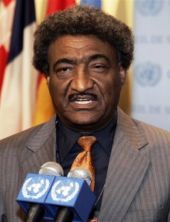US should be ‘ashamed’ of new sanctions – Sudanese UN envoy
May 31, 2007 (UNITED NATIONS) — Sudan’s U.N. ambassador accused President George W. Bush of imposing new economic sanctions against his country for domestic political reasons and said the U.S. should feel “ashamed” because the government is making progress on peacekeeping, political, and humanitarian issues in Darfur.

But he noted that when the U.S. first imposed sanctions nearly 10 years ago, “we make miracles…and we emerged as an oil exporting country because of their sanctions.”
“Now maybe it is a blessing in disguise,” Mohamad said. “We will prove to them that we are resilient and we will grow stronger than what they think. We will transform the challenges into opportunities.”
In November 1997, the U.S. imposed sanctions on Sudan for supporting international terrorism, destabilizing neighboring governments and human rights violations. It cut off about 130 Sudanese companies from the U.S. banking system, forcing them to find ways to do business outside the sanctions framework.
Bush ordered new sanctions Tuesday to pressure Sudan’s government to halt the bloodshed in Darfur that the administration has condemned as genocide.
More than 200,000 have died and 2.5 million have been displaced in the four-year conflict between ethnic African rebels and pro-government janjaweed militia. A beleaguered, 7,000-strong African Union force has been unable to stop the fighting in Darfur, and neither has a peace agreement signed a year ago between the government and one rebel group.
Bush accused the Sudanese government of being “complicit in the bombing, murder and rape of innocent civilians” and said “the world has a responsibility to put an end to it.”
Responding to Mohamad’s allegations, Richard Grenell, spokesman for the U.S. Mission to the U.N., said Thursday: “The regime in Sudan has blocked, obstructed, and slowed the pace of Security Council action to end this tragedy. The American sanctions are designed to change the behavior of the government of Sudan.”
The new U.S. sanctions bar 30 government-run companies, mainly involved in Sudan’s oil industry, and one company suspected of shipping arms to Darfur from using the U.S. banking system. The measures also target three individuals, including a rebel leader, suspected of being involved in the violence in Darfur.
“Unfortunately, the United States is politicizing the oil industry because of its very silly objectives in Darfur and elsewhere,” Mohamad said.
He said the U.S. decision to impose sanctions and to seek U.N. sanctions against Sudan took the international community by surprise, “but not Sudan, because we have a long history of understanding the way this irresponsible country behaves.”
“Unfortunately their sanctions…came not because of our inaction, it came because of our action, because we are active, because we are cooperating, because we are progressing on various fronts – the humanitarian, the political and the peacekeeping,” Mohamad said.
The U.S. sanctions moves come at a delicate time in negotiations on a 23,000-strong U.N.-African Union “hybrid” force for Darfur, and efforts by the two organizations to get all combatants to the negotiating table.
Last November, Sudan’s President Omar al-Bashir agreed to a three-phase U.N. plan to strengthen the beleaguered 7,000-strong African Union force in Darfur – but he has delayed its implementation and backtracked on the hybrid force.
The AU and the U.N. agreed last Thursday on details of the hybrid force. Secretary-General Ban Ki-moon handed the proposal to Mohamad on Friday, and the Security Council welcomed the transmission of the report and urged all parties to meet their obligations.
“I think they have to feel ashamed of themselves because Friday they passed a presidential statement in the Security Council welcoming that they received the report about the hybrid operation…and then they come only after three or four days to sanction Sudan,” Mohamad said.
“So it has no ethical background, it has no political justification, it has nothing to do with reality – U.S. sanctions,” he said. “I think it’s now very clear for members of the Security Council to know that the issue has nothing to do with Darfur. It has only to do with settling domestic (issues) in the United States with Democrats, NGOs,” he said.
“During election year, they made so many promises that they want to sanction Sudan and they understood that Sudan is going very fast in cooperating with the international community, so they said…better do it now,” Mohamad said.
Despite the U.S. sanctions and the threat of U.N. sanctions, he said Sudan will attend a meeting June 5-6 in Addis Ababa, Ethiopia on the hybrid force proposal, in response to a request from Ban.
“We want it to go ahead,” Mohamad said. “We will continue with our commitments with the international community. The American sanctions will have no bearing at all with our cooperation with the U.N….and the United States at the end will be isolated, as it is now isolated.”
(AP)
